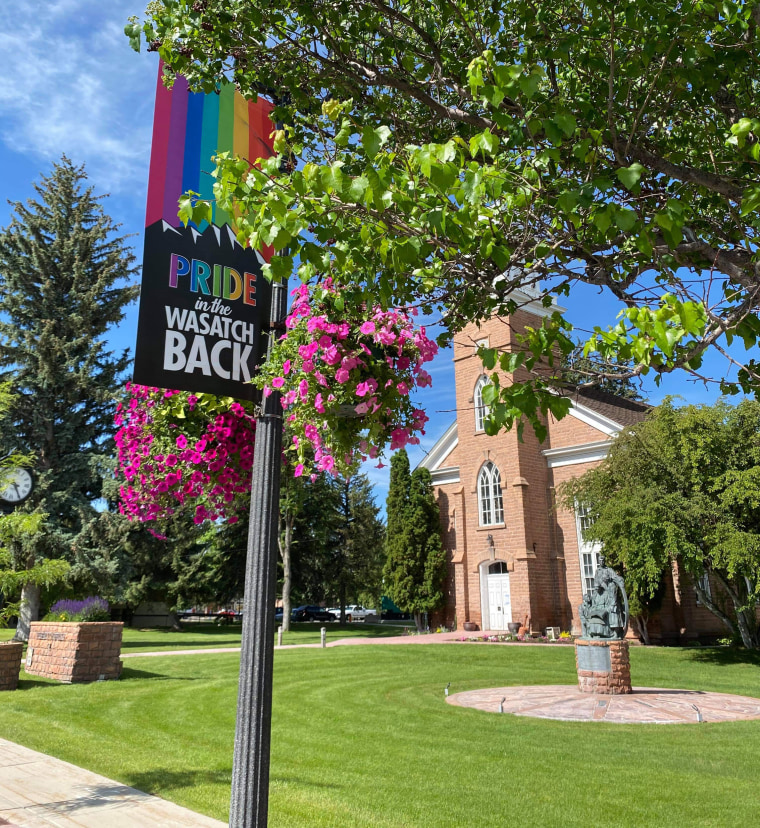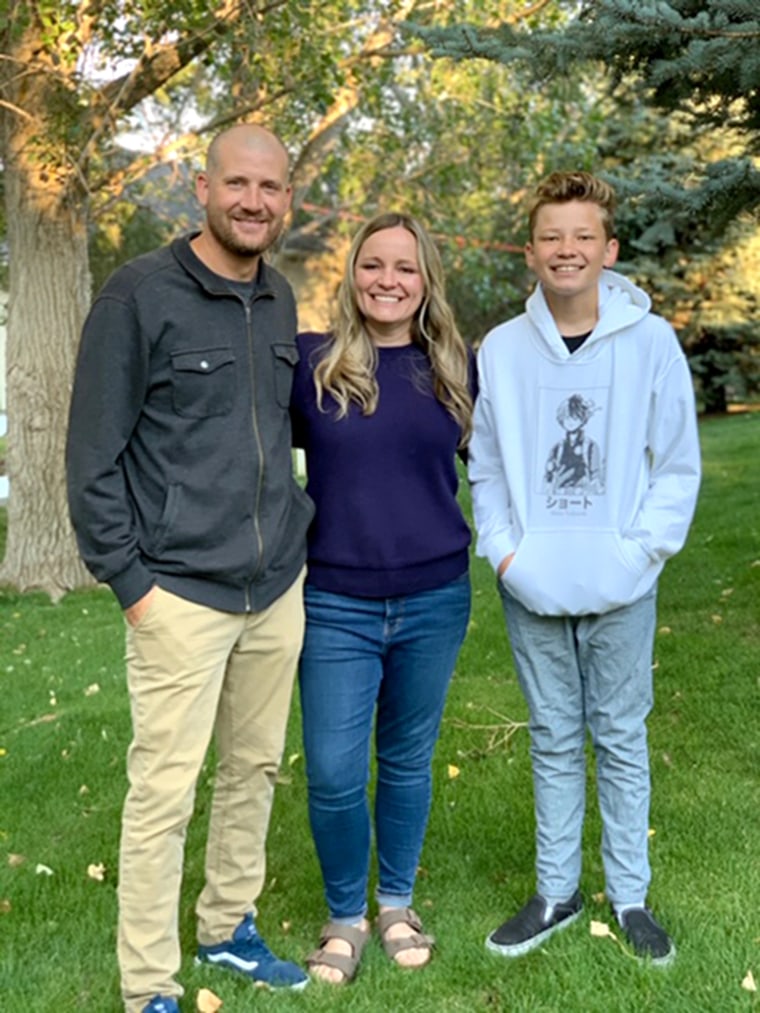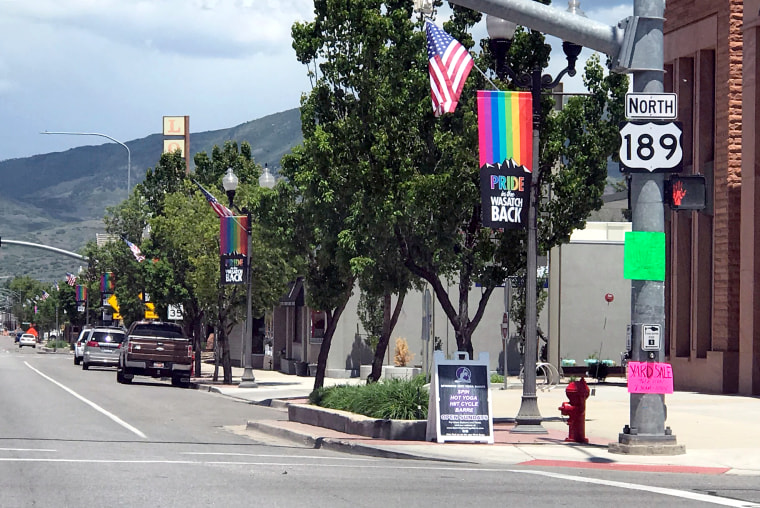For the past two years, residents in the small Rocky Mountain town of Heber City, Utah, have seen their main street bedecked with rainbow banners in celebration of Pride Month in June.
However, after the City Council voted for a controversial ordinance regulating banners, LGBTQ advocates said they fear the colorful displays will be a thing of the past.
“It feels like a slap in the face,” said Allison Phillips Belnap, 47, a local real estate attorney who raised $3,553 through a GoFundMe campaign to purchase and install the banners on city lampposts.
The new ordinance, passed in August, requires banner applications be reviewed by the city manager, with appeals submitted to the council for review. Any event or message promoted on the signage must be sponsored by Heber City, Wasatch County or the Heber Valley Chamber of Commerce, and events must be both nonpolitical and nonprofit. Due to the ongoing debate within the community over whether Pride banners are “political” speech, and since the new ordinance bans political banners, it’s unclear whether city officials will approve them next June.
Heber City Mayor Kelleen Potter, the mother of two LGBTQ teens, opposed the ordinance.
“It has pretty much eliminated the option of private citizens funding banners and requesting them to be hung on Main Street, unless they are able to get sponsorship from the city, the county or the chamber, and that sponsorship means some financial sponsorship,” she said.
Prior to the ordinance, residents could apply to display banners on city lampposts for a fee of a few hundred dollars, so long as banners were noncommercial, according to Potter. Banners were approved by the public works department, and if public works had concerns about an application, they sent it to Potter for approval. Typically, banners advertise holidays and local events, such as Veterans Days and Heber Valley’s sheepdog competition, Potter said. No one questioned the process until June 2019, when residents saw their downtown adorned in rainbow banners for the first time.
A day after they appeared along Main Street, residents filled a city council meeting to voice divided opinions over them. While many were thrilled, others saw the rainbow banners as government-sanctioned “political speech,” according to Potter. She said city officials began receiving phone calls and emails from people who wanted to know if they could hypothetically apply to install flags with anti-abortion or anti-pornography messages, or with Ku Klux Klan or Nazi symbols, though no one actually applied to install such banners. Still, the inquiries sparked debate among city officials over whether an ordinance was needed to regulate them.
“No one ever gave me a specific example besides those that we could dismiss easily as hate speech,” said Potter, who had approved the Pride banners the past two years.
‘Are we the silent majority?’
Home to about 16,000 people, Heber City is a microcosm of how small towns across America are adjusting to evolving attitudes around gender and sexuality.
Last year, Mayor Wally Scott of Reading, Pennsylvania, canceled a Pride flag ceremony, calling the flag a political symbol. After criticism, he reversed his decision, and the rainbow flag flew over the city last June.
This past June, debate swarmed in Woonsocket, Rhode Island, a town of about 42,000, after the town’s first Pride flag was relocated to what many residents considered a less visible location. That same month, officials in Foster City, California, a town of about 34,000, refused a request to raise a Pride flag outside the city’s municipal building in celebration of Pride Month. Councilman Sam Hindi told the Bay Area Reporter that doing so would open the door for hate groups to fly banners in the city.
Just last month, after some residents in Minot, North Dakota, voiced anger over a rainbow flag that was temporarily hoisted outside city hall, a lesbian council member came out publicly in fierce defense of the flag. Her speech was captured in a now-viral video posted online. Minot has since banned flags other than the American flag until it decides on an official policy.
Throughout Utah, rainbow flags are becoming common and increasingly controversial. Last year, Project Rainbow, a small Salt Lake City-based nonprofit, rented out rainbow flags for $14 that Utahans could stake in their lawns for the duration of their city’s Pride festivities. The group staked about 1,400 flags, and raised about $20,000, which it donated to local LGBTQ centers. The flags were not all well-received: The group received backlash on social media from people accusing it of “forcing their beliefs” on local communities, according to the group’s founder, Lucas Horns. Horns estimated that about 10 percent of last year’s flags were stolen or vandalized.
This month, for National Coming Out Day on Oct. 11, the group staked 3,000 Pride flags.
“It does seem like there was an uptick in stolen flags and particularly vandalized flags,” Horns said in an email to NBC News. “A number of people found their flags torn or written on or even lit on fire, which I think speaks to a more emboldened hatred. But with that said, more people signed up for flags than ever before and were more excited about showing love and support to the LGBTQ community than ever.”

When Pride banners were installed along Main Street in Heber City this past June, there was less controversy than there had been the year prior, according to Mayor Potter. Still, residents took to the town’s local “Ask (Heber, Utah)” Facebook group to debate them. One mother expressed frustration over having to explain the meaning of the rainbows to her young children.
“As a Christian, our family believes that marriage is between a man and a woman. I’d like to think that there are other people in this valley who feel the same way. Are we the silent majority? If you still believe in Christian values, please speak up,” the woman wrote.
In August, after the second wave of backlash, the City Council voted to pass the banner ordinance. City Council Member Ryan Stack took to the “Ask (Heber, Utah)” Facebook group to explain why he voted in favor of the measure.
“By playing favorites and choosing only those banners it wants to see, a governing body engages in illegal viewpoint discrimination,” he wrote. “I supported removing the element of discretion by allowing only government speech on the banners. Yes — this prohibits private banners on Main Street. But it also protects the City in the stronger way to insulate it from potential legal claims when it comes to decisions regarding banner display.”
Heber City Council Member Mike Johnston, who also voted for the ordinance, told NBC News that it does not ban Pride banners, but is rather a way to keep out potentially hateful and divisive messages.
“If we decide — and I hope we will — that Pride is something we want to support, then we will do that as a city council, as elected officials, who are elected to make the decisions and take the heat,” Johnston said. “I think we're big girls and big boys, and we can make those decisions, but it's tough when you let anybody in the public submit banners to put up, and basically, they're making a free speech statement that, ‘You have to let me do that, because that's what you do, you let everybody do it, so you have to let me do it.’”
Political speech or symbol of inclusion?
Phillips Belnap claimed Heber City council members passed the ordinance to appease a religious minority who opposed the banners. She said the ordinance will likely prevent her from installing them next year, since it will require her to organize an event, such as a Pride festival, with financial sponsorship from the city, county or chamber of commerce.
“We're not going to be able to get this council to sponsor a Pride festival or to get the county to sponsor a pride festival,” she said, referring to the ongoing debate over whether the banners are “political.”
She rejected criticism that her banners are political symbols. A lesbian who left the Church of Jesus Christ of Latter-day Saints (commonly referred to as the Mormon Church) after multiple suicide attempts, Phillips Belnap said the banners were intended to reduce suicide among local LGBTQ youth.
“We have a large number of people who are closeted and at high risk of suicide, because they feel like coming out is the equivalent of ruining their lives and ruining their family's lives,” she said.
In Utah, where about 60 percent of the population identifies as Mormon, youth suicide rates have tripled since 2007, according to state data. This mirrors a national epidemic, where suicide rates among youth ages 10-24 increased 57 percent from 2007 to 2018, and suicide was the second-leading cause of death among people ages 10-34 in 2018, according to the Centers for Disease Control and Prevention.
The CDC recently found that lesbian, gay and bisexual teens are more than four times as likely to attempt suicide than their straight peers.

Heber City resident Jamie Belnap, 41 (no relation to Phillips Belnap), whose 14-year-old son, Luke, is openly gay, said the banners “made us feel great” in a town where few LGBTQ people feel visible.
“Kids who don't feel comfortable coming out yet, at least they know that our community is working towards being a welcoming place for them and that they're seen and valued, so I know my son felt that way,” Belnap said.
Deeply conservative Utah has begun to warm on LGBTQ issues. In 2015, the state’s Republican-dominated Legislature passed “the Utah compromise,” a law that made Utah the only solidly conservative state to pass some protections in housing and employment for LGBTQ people. Two years later, Utah became the first of eight conservative states to repeal a “No Promo Homo” law that prohibited discussing LGBTQ issues in schools. And this past January, it became the 19th state to ban conversion therapy for minors, a controversial practice that aims to change a person’s sexual orientation or gender identity. It was the most politically conservative state to do so.
One reason for this shift could be a growing tendency among Mormon parents to embrace their LGBTQ children. In recent years, the Mama Dragons, an online support group for Mormon moms of LGBTQ kids, has grown to thousands of members. The group, which Mayor Potter joined after one of her own children came out, has pushed acceptance for LGBTQ youth among families in Utah.
Despite progress, Potter said many LGBTQ teens still feel isolated in Heber City.
“In a self-reported survey, 12 percent of our students at our high school report that they are somewhere in the LGBTQ community — that's a lot of kids. And one of the top three issues they've identified are mental health issues, and so as we all bang our heads against the wall about how to help these kids, this was something that really was helping, because it created a more inclusive and accepting feeling,” she said of the Pride banners.
According to the National Survey on LGBTQ Youth Mental Health 2020, LGBTQ teens with high levels of social support were “significantly” less likely to attempt suicide than those without.
‘A pretty strong message’
Three hundred miles southwest of Heber City, a similar controversy flared in the small desert town of St. George, Utah, where rainbow banners fluttered on lampposts along the town’s main thoroughfare last September.
Pride of Southern Utah, a local LGBTQ advocacy group, raised $6,100 to install the banners in St. George, as well as the towns of Cedar City and Hurricane. The banners promoted the group’s annual Pride Week festival, which is typically held in mid-September. After raising the money, the group obtained a permit to have the banners installed.
After they appeared, city officials received at least two informal inquiries from a white supremacist group and another group that wanted to display banners with President Donald Trump’s slogan “Make America Great Again,” according to St. George Mayor John Pike. In an email circulated on social media that year, a St. George councilwoman referred to the rainbow Pride banners as “political statements,” unleashing a debate over whether a current ordinance surrounding public signage should be reevaluated. In response to the backlash, St. George put a moratorium on applications for lamppost banners until officials could revisit the city’s existing ordinance.
Because the Covid-19 pandemic forced the annual Pride festival to be canceled, the group has not applied to resurrect the banners this year, according to Pride of Southern Utah Director Stephen Lambert. But Lambert said he is confident that St. George officials will approve the banners in 2021.
On the topic of Heber City, Lambert said he understands the desire for an ordinance but also expressed concern.
“The real damage, I think will be if Heber [City] says, ‘Well, we're just not going to do it, because we made a law that prevents you from doing this,’” Lambert said. “They need to figure out a way to keep out the riff raff and the negative and the hate, and keep in the people that need it.”
Despite the backlash against Pride banners, Phillips Belnap said the awareness they’ve created has helped encourage many in Heber City’s small LGBTQ community to come together. A local LGBTQ Facebook group that she started now has about 150 people, she said, and the local middle and high school have formed Gay-Straight Alliances clubs.
Jamie Belnap said her son was “very disappointed” by the ordinance but was also not surprised that it passed.
“I think it's almost worse when the flags go up, and everybody feels seen and everybody feels like, ‘Oh, this is such a movement in the right direction’ … and then you see the backlash,” she said. And then to see the city give in to that backlash, she added, “That’s a pretty strong message — almost more so than if the flags had not been up.”




